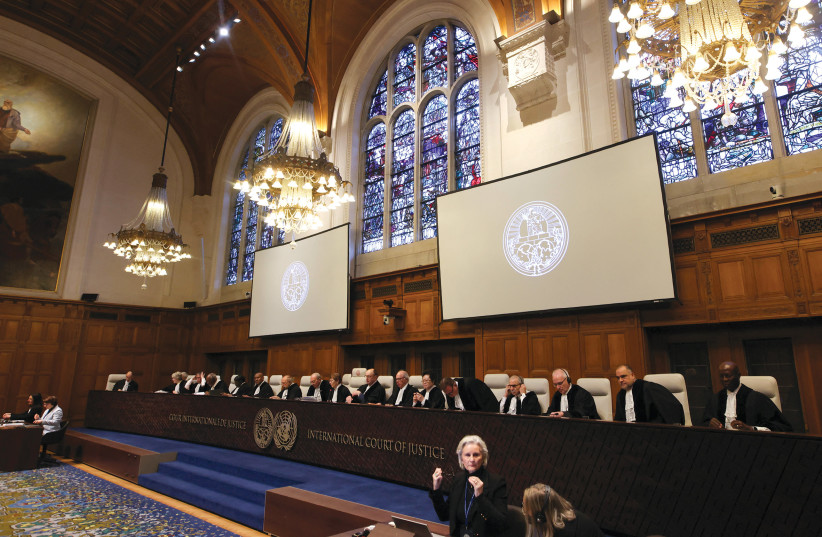Julia Sebutinde, the Ugandan judge who was the only member of the International Court of Justice (ICJ) to vote against all of that court's provisional measures in South Africa's case against Israel alleging genocide in Gaza, has been elected by her peers to serve as the ICJ's vice-president. She will serve alongside Lebanese Judge Nawaf Salam, who was elected president of the court. They will hold their positions for three years.
Sebutinde, until January a relatively obscure figure on the international scene, rose to prominence when she rejected all nine of the court's 'provisional measures' to respond to the genocide against Palestinians alleged by South Africa. The court did not rule on the merits of the case— that determination is reserved for a later stage in the proceedings— but ruled that South Africa's allegation was at least plausible on its face.
Though South Africa had requested that the court order Israel to cease all military activity in Gaza, the court did not make this demand, nor did it point to any specific activity by Israel that it considered a violation, or even a plausible violation, of the genocide convention. Rather, the court merely ordered that Israel take all necessary measures to prevent or punish violations of the genocide convention, facilitate the supply of humanitarian aid to the Gaza Strip, preserve evidence of possible acts of genocide to be investigated in the future, and report to the court in a month about its doing so.
All but two of the panel’s seventeen judges voted in favor of all six of the court’s provisional measures. The only judges to vote against any of them were Sebutinde, who voted against all of them, and Judge Aharon Barak, the legendary and controversial Israeli legal scholar whom the country appointed as an ad-hoc judge for this case, a prerogative of states on trial at the court.
Even Barak, however, voted in favor of the measure demanding efforts to facilitate the provision of humanitarian aid as well as a measure demanding Israel "take all measures within its power to prevent and punish the direct and public incitement to commit genocide in relation to members of the Palestinian group in the Gaza Strip." Only Sebutinde rejected all the measures outright.

Sebutinde’s dissent rejected South Africa’s case, raised issue of hostages
In her dissent, which ran six pages and was filed alongside the court’s majority’s opinion, Sebutinde wrote that the conflict between Israel and the Palestinians is essentially a political one, not the sort of disagreement that the ICJ is meant to litigate, and that South Africa failed to demonstrate genocidal intent by Israel in its war with Hamas, even by a mere plausibility standard, noting the measures Israel takes to minimize civilian casualties.
Sebutinde also wrote that, even if genocidal intent had been proven plausible by South Africa, the provisional measures requested by that country’s legal team, and the ones ultimately indicated by the court, would not follow from those findings. She also took issue with the measures themselves as essentially just recapitulations of Israel’s existing commitments under the genocide convention itself. Provisional measures should not be redundant, she wrote.
The Ugandan judge also made a point of including in her dissent “a word about the Israeli hostages that remain in the custody of their captors,” noting that “it was brought to the attention of the Court that South Africa, and in particular certain organs of government, have enjoyed and continue to enjoy a cordial relationship with the leadership of Hamas. If that is the case,” she wrote, “ then one would encourage South Africa…to try [to] persuade Hamas to immediately and unconditionally release the remaining hostages.”
Sebutinde will serve alongside Lebanese Judge Nawaf Salam
Sebutinde’s vice presidency will coincide with Judge Nawaf Salam’s term as president of the court. Salam, who hails from Lebanon, voted in favor of all the court’s provisional measures in the Gaza case.
The International Court of Justice in The Hague is the only international court to adjudicate disputes between nations. It was founded in 1945 and is one of the six organs of the United Nations, serving “first, to settle, in accordance with international law, legal disputes submitted to it by States; and, second, to give advisory opinions on legal questions referred to it by duly authorized United Nations organs and agencies of the system.”
It is separate from the International Criminal Court, also a UN-administered international body located in The Hague, which tries individuals for crimes against international law.
